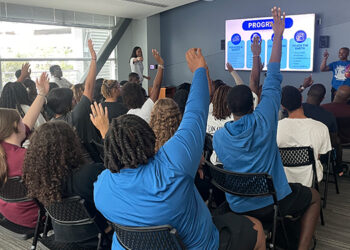Cell phone policies in campus rec centers have been changing since the evolution of camera phones. With the ability to call, text, play music and take photos, phones are constantly in patron’s hands while in your facility. So how do you adjust your policy to be fair, and meet safety and privacy concerns?
Below, three campus rec professionals discuss their cell phone policies, how they make patrons aware and what they do to handle policy infractions:
Jerrod Jackson, the associate director of programs and outreach at Louisiana State University (LSU)
LSU’s Cell Phone Policy:
Photography is permitted in LSU UREC facilities for personal, non-commercial and lawful use provided permission has been granted by the individual(s) being photographed. The taking, capturing or recording of any and all photography, audio, or video of any kind in the pool, men’s and women’s locker rooms, and restrooms is strictly prohibited. Those who seek to photograph, film, or interview individuals at LSU UREC facilities for commercial use, media use, or class projects, must receive prior written approval from UREC administration prior to accessing LSU UREC facilities.
“We feel this is important because our philosophy is everyone is welcome at UREC,” said Jackson. “In order to create that atmosphere, we want people to be respectful of all in their surroundings and that includes any photography. In addition to the policies outlined upstairs, we also have selfie free zones in our locker room areas.”
The LSU UREC cell phone policy is outlined on their website, as well as posted on signs labeled as “selfie free zones” throughout the building. If a patron is found not following the guidelines, they are made aware of the violation, asked to stop and if uncooperative, they are removed from the facility.
Cristie Carpenter, the associate director of campus recreation and wellness promotion at Texas Christian University (TCU)
TCU’s Cell Phone Policy:
Due to privacy issues and video concerns, members are asked not to use cell phones in the locker rooms or bathrooms. Misuse of cell phones in any other areas of the facility, especially for video use, will result in removal from the facility and revocation of privileges.
“It’s a hard policy to have as far as the whole building is concerned because that’s the world we live in,” said Carpenter. “There’s a chance you’re being recorded all the time by people. But as far as the restrooms and locker rooms go, you are entitled to privacy. If that means we have to ensure no one has their phones out so you can feel safe and know it’s a private environment while you are in the locker room, then that’s the policy we have to enforce.”
At TCU, signage stating “no cell phones allowed” is posted outside the locker rooms, in restrooms and on the sauna doors. Additionally, mirror clings with “no cell phone zones” are placed on all mirrors in the locker rooms and restrooms.
Timothy Moore, the executive director of physical education, recreation and dance at Boston University
Boston’s Cell Phone Policy:
- Phone calls, texts and photography are strictly prohibited at all times in any activity area, classroom, locker room or restroom, including the Gerald Tsai Jr. Fitness Center, multi-purpose rooms, gymnasia, track, climbing wall, squash/racquetball courts and inside the pool area.
- Cell phones may be used for listening to audio or using fitness-related applications.
- The use of any device, including a mobile phone or tablet, for photography and/or videotaping is not allowed unless prior written authorization is obtained from the management of the fitness and recreation center.
- Members are permitted to use electronic handheld tablets on the fitness floor for personal viewing and/or audio use.
- Inappropriate use of phones, cameras and electronic tablets may result in corrective action, up to and including permanent dismissal from the facility.
- FitRec is not responsible for lost or stolen property.
When Moore first came to Boston in 2013, campus recreation had a very strict cell phone policy. “We soon after found it was too strict to allow for personal use for listening to music or using fitness related apps,” he said. “The result was the policy above. We don’t have many problems working with members to maintain these policies, and we do need to enforce them occasionally – usually this involves someone talking loudly on their phone while using cardio equipment.”










